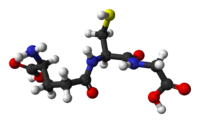
Photo from wikipedia
Heterologous expression of nrps33, a nonribosomal peptide synthetase gene, from Paecilomyces cinnamomeus BCC 9616 in Saccharomyces cerevisiae unexpectedly resulted in the accumulation of anthranilic acid, an intermediate in tryptophan biosynthesis.… Click to show full abstract
Heterologous expression of nrps33, a nonribosomal peptide synthetase gene, from Paecilomyces cinnamomeus BCC 9616 in Saccharomyces cerevisiae unexpectedly resulted in the accumulation of anthranilic acid, an intermediate in tryptophan biosynthesis. Based on transcriptomic and real‐time quantitative polymerase chain reaction (RT‐qPCR) results, expression of nrps33 affected the transcription of tryptophan biosynthesis genes especially TRP1 which is also the selectable auxotrophic marker for the expression vector used in this work. The product of nrps33 could inhibit the activity of Trp4 involved in the conversion of anthranilate to N‐(5′‐phosphoribosyl)anthranilate and therefore caused the accumulation of anthranilic acid. This accumulation could in turn result in down‐regulation of downstream tryptophan biosynthesis genes. Anthranilic acid is typically produced by chemical synthesis and has been used as a substrate for synthesising bioactive compounds including commercial drugs; our results could provide a new biological platform for production of this compound.
Journal Title: ChemBioChem
Year Published: 2022
Link to full text (if available)
Share on Social Media: Sign Up to like & get
recommendations!